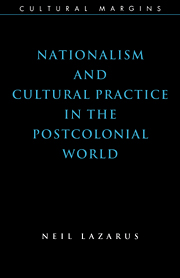Book contents
- Frontmatter
- Contents
- Acknowledgments
- Introduction: hating tradition properly
- 1 Modernity, globalization, and the “West”
- 2 Disavowing decolonization: nationalism, intellectuals, and the question of representation in postcolonial theory
- 3 Cricket, modernism, national culture: the case of C. L. R. James
- 4 “Unsystematic fingers at the conditions of the times”: Af ropop and the paradoxes of imperialism
- Notes
- Bibliography
- Index
- Cultural Margins
1 - Modernity, globalization, and the “West”
Published online by Cambridge University Press: 02 December 2009
- Frontmatter
- Contents
- Acknowledgments
- Introduction: hating tradition properly
- 1 Modernity, globalization, and the “West”
- 2 Disavowing decolonization: nationalism, intellectuals, and the question of representation in postcolonial theory
- 3 Cricket, modernism, national culture: the case of C. L. R. James
- 4 “Unsystematic fingers at the conditions of the times”: Af ropop and the paradoxes of imperialism
- Notes
- Bibliography
- Index
- Cultural Margins
Summary
In Postmodernism, or, the Cultural Logic of Late Capitalism, Fredric Jameson suggests that with its propensities toward “infinite expansion,” capitalism “may be said to reinvent history in a new way, and also to constitute an incomparable and hitherto novel form of social imperialism.” My argument in this chapter takes as its point of departure this inherited Marxist understanding that capitalism – from this standpoint the foundational category for any credible theory of modern society – is unprecedented as an historical formation both in its global extension as a mode of production and in its intensive saturation of social relations, in terms of which the logic of abstract equivalence (a logic corresponding to the material instance of generalized commodity production) writes itself upon social practice in general. What Jameson calls the “social imperialism” inaugurated by capitalism entails the progressive integration of the world system as such – along the axes of both “breadth” (combined and uneven development, the articulation of modes of production) and “depth” (the traversing not only of the sphere of production and the civic domain, but also of what Stuart Hall, in an arresting metaphor, once referred to as “the Maginot Lines of our subjectivities”) – under the dominant rubrics of commodity production and socialized wage labor. The singularity of capitalism as an historical formation consists precisely in this relentless and almost irresistible tendency toward universalization.
My commitment to this received Marxist understanding – both systematic and totalizing – will doubtless strike at least some of my prospective readers as counter-intuitive or even perverse. Nor am I thinking in purely abstract terms here, of “readers in general.”
- Type
- Chapter
- Information
- Publisher: Cambridge University PressPrint publication year: 1999



